Module 3 Making plans>Unit 1 What are you going to do at the weekends?
文档属性
| 名称 | Module 3 Making plans>Unit 1 What are you going to do at the weekends? | 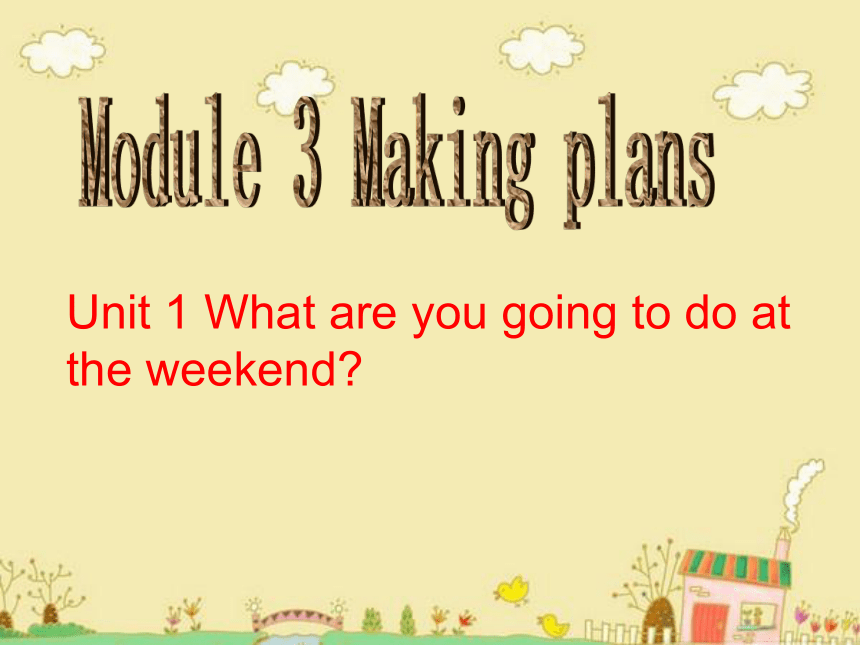 | |
| 格式 | zip | ||
| 文件大小 | 967.5KB | ||
| 资源类型 | 教案 | ||
| 版本资源 | 外研版 | ||
| 科目 | 英语 | ||
| 更新时间 | 2015-03-24 20:59:21 | ||
图片预览

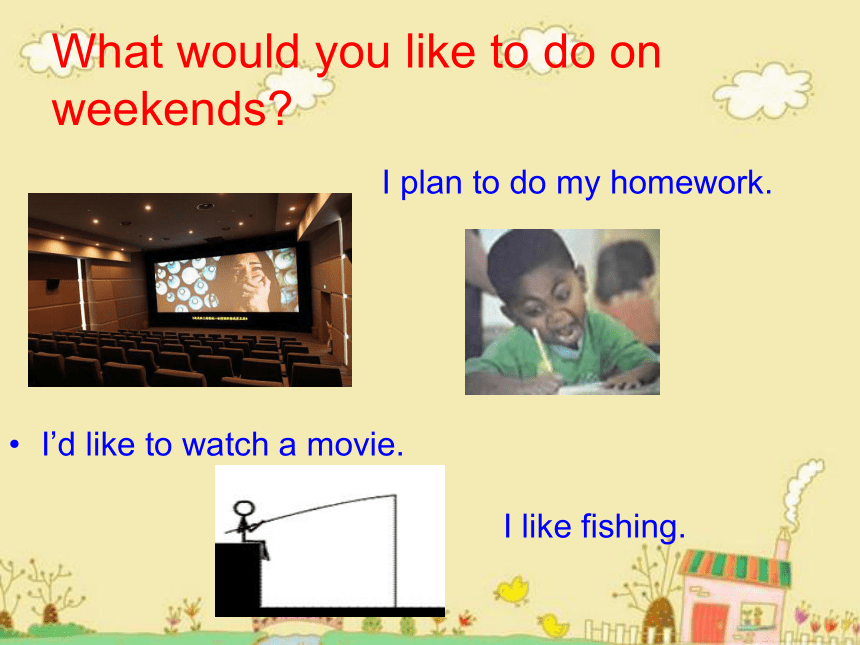


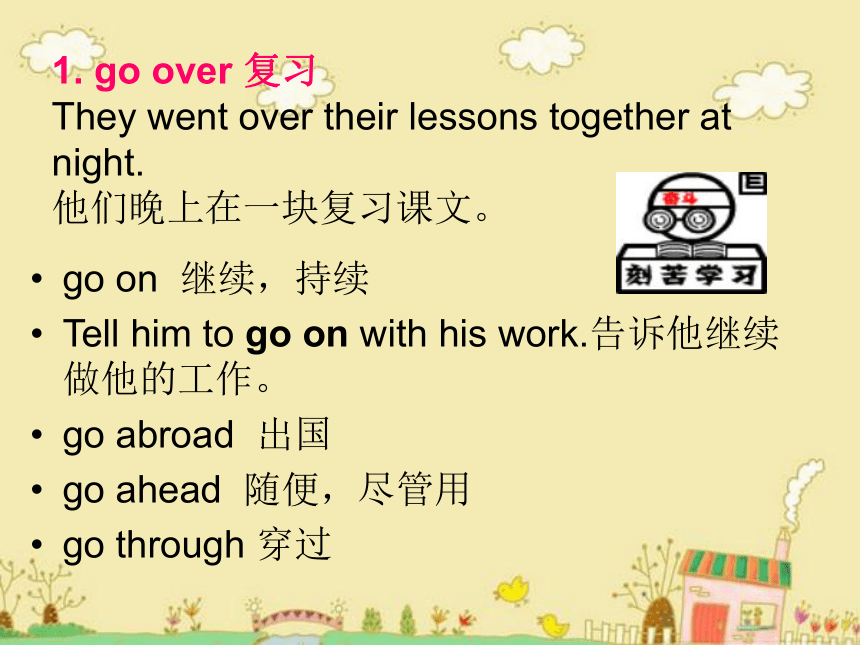
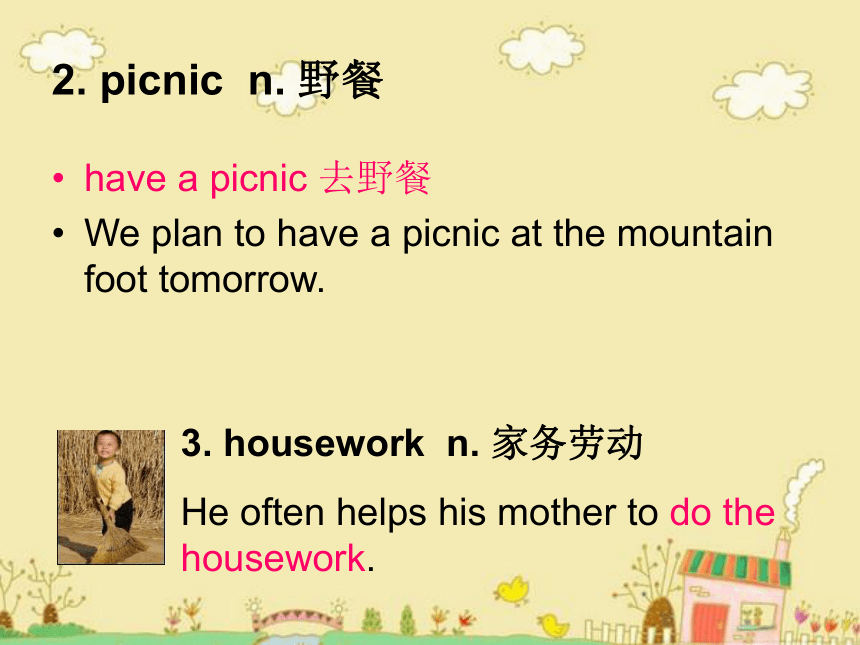
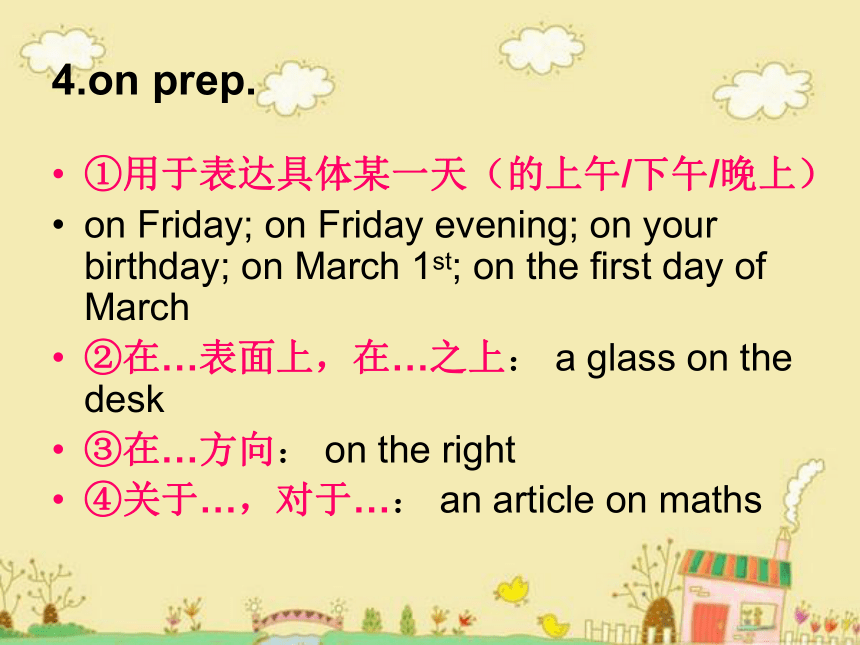
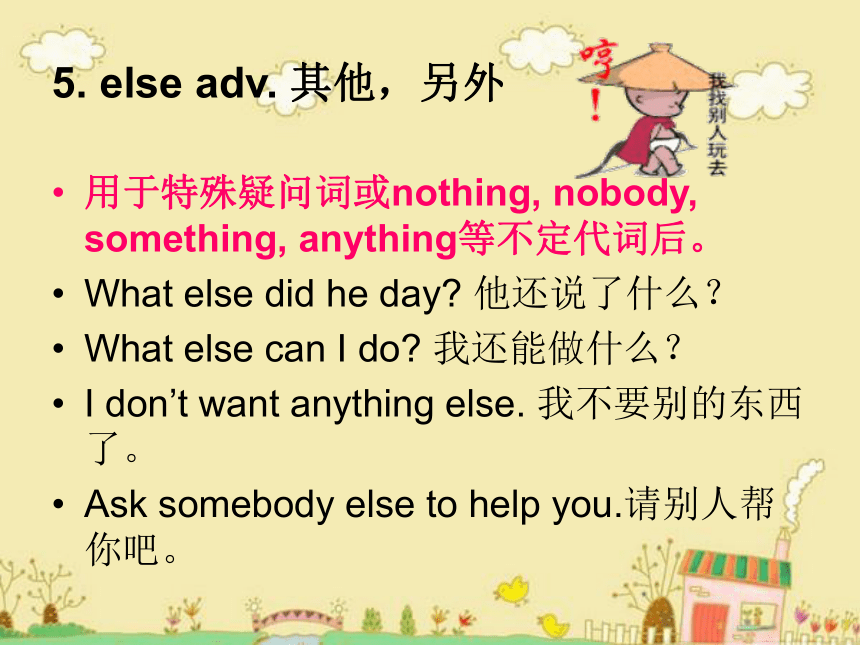
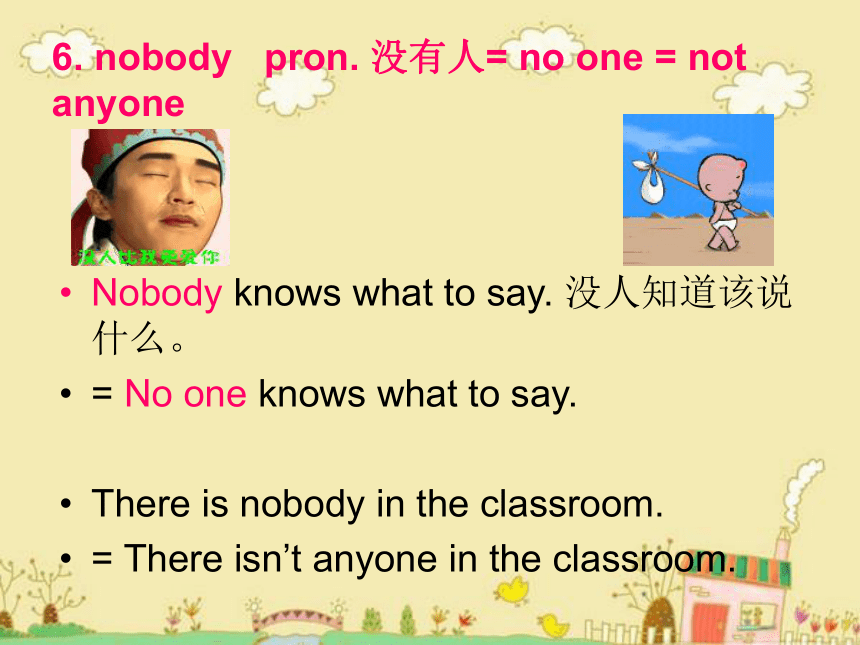
文档简介
课件24张PPT。Unit 1 What are you going to do at the weekend?Module 3 Making plansWhat would you like to do on weekends?I’d like to watch a movie.I plan to do my homework.I like fishing.还可以怎么说呢?I want to play computer games.New words and phrasesgo on 继续,持续
Tell him to go on with his work.告诉他继续做他的工作。
go abroad 出国
go ahead 随便,尽管用
go through 穿过
1. go over 复习 They went over their lessons together at night. 他们晚上在一块复习课文。2. picnic n. 野餐have a picnic 去野餐
We plan to have a picnic at the mountain foot tomorrow.3. housework n. 家务劳动
He often helps his mother to do the housework.4.on prep. ①用于表达具体某一天(的上午/下午/晚上)
on Friday; on Friday evening; on your birthday; on March 1st; on the first day of March
②在…表面上,在…之上: a glass on the desk
③在…方向: on the right
④关于…,对于…: an article on maths
5. else adv. 其他,另外用于特殊疑问词或nothing, nobody, something, anything等不定代词后。
What else did he day? 他还说了什么?
What else can I do? 我还能做什么?
I don’t want anything else. 我不要别的东西了。
Ask somebody else to help you.请别人帮你吧。6. nobody pron. 没有人= no one = not anyoneNobody knows what to say. 没人知道该说什么。
= No one knows what to say.
There is nobody in the classroom.
= There isn’t anyone in the classroom.
7. silly adj. 愚蠢的,傻气的a silly idea/ question 愚蠢的想法/ 问题= foolish
a silly game/ joke 无聊的游戏/ 笑话= stupid8. fantastic adj. 极好的
a fantastic beach in Australia 澳大利亚旖旎的海滩
The weather is fantastic. 天气十分宜人。
a fantastic idea 不切实际/ 富于想象的想法学英语是极好的!Language points1. What are you going to do at the weekend, Daming?“what+ be+主语+ going to do sth”这一句型用来提问某人打算做某事。
他明天打算做什么?
What is he going to do tomorrow?
他们明天打算做什么?
What are they going to do tomorrow?2. On Saturday morning, I’m going to check my email and do my homework.如果我们要表达“在上午/下午/晚上”,可以说in the morning/afternoon/eveing; 但如果特指某一天的上午/下午/晚上,或者什么样的上午/下午/晚上,则要用介词on
I’ll see you on Monday morning.
I always go to see a film on Friday evening.
They like to fly kites on sunny afternoons.3. Who else is going to be there?else用于特殊疑问词或nothing, nobody, something, anything等不定代词后。
这句的主语是特殊疑问词who,后跟be going to 句型,只是后面带的动词是be动词。Am, is, are放在不定式符号to后面,要改为原形be!
我想再次做一名学生。
I want to be a student again.
她帮助我成为一名真正的教师。
She helps me to be a real teacher. 4. But on Sunday afternoon, Lingling and I are going to have a picnic.have a picnic意思是“去野餐”。在英语中,经常用 have+n. 构成词组。
have a look 看一看
have breakfast/ lunch/ supper 吃饭
have classes/ lessons 上课
have a good time 玩的愉快
have a meeting 开会
have a rest 休息5. What are your plans for the weekend?特殊疑问词what是主语,are是谓语,your plans是宾语,for the weekend是修饰plans的。For表示目的,对象等。
你新年的计划是什么?
What is your plan for the new year?
我想要张纸写信。
I want a piece of paper for writing a letter.
6. Don’t be silly! 别傻了这是一个祈使句。祈使句表示命令,请求,叮嘱,邀请,劝告等。祈使句的主语都是you,一般省略。肯定形式以动词原形开头,否定形式以don’t开头。
The teacher says, “be quiet!”
Don’t be sad!
Close the window!
Don’t open the door!Grammar focusbe going to此结构用于表达“打算、计划或有意做某事。”
be动词是根据主语来变换的,这里的to是不定式符号,后跟动词原形。
I am/ you are/ he is/ they are going to check my emails this morning.
此结构的疑问形式将be动词提至主语前。
Are you going to…?
否定形式在be动词后加not。
He isn’t going to….Let's practise!Homework1.Copy the new words and memorize them.
2. Recite the text.
3. Complete the exercise book.See you!
Tell him to go on with his work.告诉他继续做他的工作。
go abroad 出国
go ahead 随便,尽管用
go through 穿过
1. go over 复习 They went over their lessons together at night. 他们晚上在一块复习课文。2. picnic n. 野餐have a picnic 去野餐
We plan to have a picnic at the mountain foot tomorrow.3. housework n. 家务劳动
He often helps his mother to do the housework.4.on prep. ①用于表达具体某一天(的上午/下午/晚上)
on Friday; on Friday evening; on your birthday; on March 1st; on the first day of March
②在…表面上,在…之上: a glass on the desk
③在…方向: on the right
④关于…,对于…: an article on maths
5. else adv. 其他,另外用于特殊疑问词或nothing, nobody, something, anything等不定代词后。
What else did he day? 他还说了什么?
What else can I do? 我还能做什么?
I don’t want anything else. 我不要别的东西了。
Ask somebody else to help you.请别人帮你吧。6. nobody pron. 没有人= no one = not anyoneNobody knows what to say. 没人知道该说什么。
= No one knows what to say.
There is nobody in the classroom.
= There isn’t anyone in the classroom.
7. silly adj. 愚蠢的,傻气的a silly idea/ question 愚蠢的想法/ 问题= foolish
a silly game/ joke 无聊的游戏/ 笑话= stupid8. fantastic adj. 极好的
a fantastic beach in Australia 澳大利亚旖旎的海滩
The weather is fantastic. 天气十分宜人。
a fantastic idea 不切实际/ 富于想象的想法学英语是极好的!Language points1. What are you going to do at the weekend, Daming?“what+ be+主语+ going to do sth”这一句型用来提问某人打算做某事。
他明天打算做什么?
What is he going to do tomorrow?
他们明天打算做什么?
What are they going to do tomorrow?2. On Saturday morning, I’m going to check my email and do my homework.如果我们要表达“在上午/下午/晚上”,可以说in the morning/afternoon/eveing; 但如果特指某一天的上午/下午/晚上,或者什么样的上午/下午/晚上,则要用介词on
I’ll see you on Monday morning.
I always go to see a film on Friday evening.
They like to fly kites on sunny afternoons.3. Who else is going to be there?else用于特殊疑问词或nothing, nobody, something, anything等不定代词后。
这句的主语是特殊疑问词who,后跟be going to 句型,只是后面带的动词是be动词。Am, is, are放在不定式符号to后面,要改为原形be!
我想再次做一名学生。
I want to be a student again.
她帮助我成为一名真正的教师。
She helps me to be a real teacher. 4. But on Sunday afternoon, Lingling and I are going to have a picnic.have a picnic意思是“去野餐”。在英语中,经常用 have+n. 构成词组。
have a look 看一看
have breakfast/ lunch/ supper 吃饭
have classes/ lessons 上课
have a good time 玩的愉快
have a meeting 开会
have a rest 休息5. What are your plans for the weekend?特殊疑问词what是主语,are是谓语,your plans是宾语,for the weekend是修饰plans的。For表示目的,对象等。
你新年的计划是什么?
What is your plan for the new year?
我想要张纸写信。
I want a piece of paper for writing a letter.
6. Don’t be silly! 别傻了这是一个祈使句。祈使句表示命令,请求,叮嘱,邀请,劝告等。祈使句的主语都是you,一般省略。肯定形式以动词原形开头,否定形式以don’t开头。
The teacher says, “be quiet!”
Don’t be sad!
Close the window!
Don’t open the door!Grammar focusbe going to此结构用于表达“打算、计划或有意做某事。”
be动词是根据主语来变换的,这里的to是不定式符号,后跟动词原形。
I am/ you are/ he is/ they are going to check my emails this morning.
此结构的疑问形式将be动词提至主语前。
Are you going to…?
否定形式在be动词后加not。
He isn’t going to….Let's practise!Homework1.Copy the new words and memorize them.
2. Recite the text.
3. Complete the exercise book.See you!
同课章节目录
- Module 1 Lost and found
- Unit 1 Whose bag is this?
- Unit 2 Are they yours?
- Unit 3 Language in use
- Module 2 What can you do ?
- Unit 1 I can play the piano
- Unit 2 I can run really fast
- Unit 3 Language in use
- Module 3 Making plans
- Unit 1 What are you going to do at the weekends?
- Unit 2 We're going to cheer the players.
- Unit 3 Language in use
- Module 4 Life in the future
- Unit 1 Everyone will study at home
- Unit 2 Every family will have a small plane.
- Unit 3 Language in use
- Module 5 Shopping
- Unit 1 What can I do for you?
- Unit 2 You can buy everything on the Internet
- Unit 3 Language in use
- Module 6 Around town
- Unit 1 Could you tell me how to get to the Nationa
- Unit 2 The London Eye is on your right.
- Unit 3 Language in use
- Revision module A
- Module 7 My past life
- Unit 1 I was born in a small village.
- Unit 2 I was born in Quincy.
- Unit 3 Language in use
- Module 8 Story time
- Unit 1 Once upon a time….
- Unit 2 Goldilocks hurried out of the house.
- Unit 3 Language in use
- Module 9 Life history
- Unit 1 He left school and began work at the age of
- Unit 2 He decided to be an actor.
- Unit 3 Language in use
- Module 10 A holiday journey
- Unit 1 What did you do?
- Unit 2 This morning we took a walk.
- Unit 3 Language in use
- Module 11 Body language
- Unit 1 They touch noses!
- Unit 2 Here are some ways to welcome them.
- Unit 3 Language in use
- Module 12 Western music
- Unit 1 It's so beautiful!
- Unit 2 Vienna is the centre of European classical
- Unit 3 Language in use
- Revision module B
